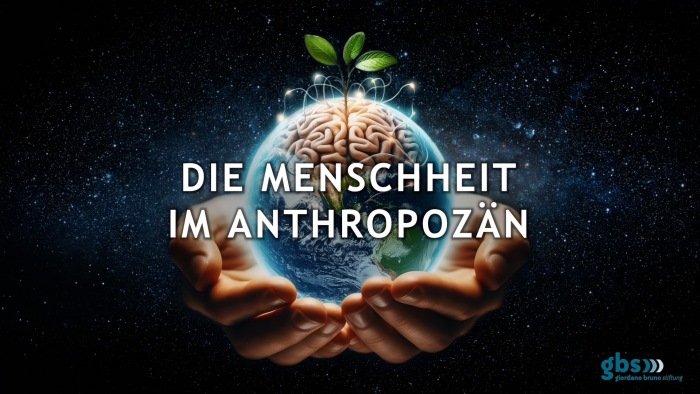Humanity in the Anthropocene [1]
Giordano Bruno Foundation Releases Video on 2024 Focus Theme
The "International Union of Geological Sciences" may announce as early as August 2024 that we are no longer in the "Holocene" – the "warm period within the current ice age" that has existed for 11,000 years – but in the "Anthropocene," the "geological age of humans." This would officially mark the beginning of a new era not only for humanity but for the entire Earth.
"Humanity in the Anthropocene" is therefore the 2024 focus theme of the Giordano Bruno Foundation (gbs), which gbs board spokesperson Michael Schmidt-Salomon presents in his recently published "virtual New Year's address" [3] (in German language). The term "Anthropocene" was coined in the early 2000s by Dutch meteorologist Paul Crutzen – and it quickly gained traction. After all, Paul Crutzen wasn't just anyone. He was known as the "savior of the ozone layer," having co-discovered the role of chlorofluorocarbons (CFCs) in the destruction of the stratospheric ozone layer, a discovery that earned him the Nobel Prize in Chemistry in 1995. Crutzen also played a key role in the implementation of effective measures to close the "ozone hole," preventing severe harm to human health and significant mutations in the biosphere.
In public debate, the word "Anthropocene" is mostly used today in a purely negative sense, framing the "age of humanity" as a "harbinger of an impending apocalypse." However, as Schmidt-Salomon explains in the video, this was not Crutzen's original intent: "The Dutch Nobel laureate wasn't interested in overcoming the Anthropocene, that is, fundamentally reducing human influence on the Earth system. Rather, his goal was to replace the 'bad' Anthropocene, where we impact nature recklessly, with a 'good' Anthropocene, where humanity lives up to its planetary responsibility."
"Enriching the Anthropocene with Humanity’s Greatest Achievements"
Paul Crutzen hoped that humanity would remain "a significant geological force for many thousands, perhaps millions of years." His focus extended beyond anthropogenic (human-made) changes in the Earth's system to include natural threats inherent to an unstable, tectonically active planet, such as supervolcanic eruptions. These could trigger global climate catastrophes (a "volcanic winter") causing temperatures to plummet by several degrees.
"Unfortunately, it's not enough to maintain a neutral relationship with the Earth system, as this too would lead to catastrophes sooner or later. Instead, we must actively preserve the extraordinarily rare and favorable climatic conditions of a 'warm period within an ice age' against both human-made and natural disruptions," Schmidt-Salomon explains. "However, to achieve this, we need to enrich the Anthropocene with the best that humanity has produced – not with plastic waste, environmental toxins, and life-hostile ideologies, but with the great achievements of science, philosophy, and art. Only in this way can we leave a 'positive footprint' in the world and act as 'stewards of our own and the planet's evolutionary future,' as Julian Huxley, the founder of evolutionary humanism, called for half a century ago."
Additional Foundation Topics for 2024
Of course, the gbs will not focus solely on the Anthropocene in 2024. In May, the foundation will celebrate the 100th birthday of writer Karlheinz Deschner [4], whose works were essential catalysts for the foundation's establishment 20 years ago. The gbs will also continue its long-term project "The Secular Decade" [5] and the various organizations and initiatives it has launched over recent years. The foundation’s commitment to its traditional mission is evident in an interview Schmidt-Salomon gave last weekend to the "Westdeutsche Zeitung" (WZ) on the ninth anniversary of the attack on the satirical newspaper "Charlie Hebdo." In the interview, he revealed that the gbs is currently planning a campaign to abolish the so-called "blasphemy paragraph" (§166 of the German Penal Code) (see the article "Taking a Clear Stand Against Religious Fanatics" [6] on the foundation’s website).
On Sunday, January 7, 2024, the "bfg München" (under the leadership of gbs curator Assunta Tammelleo and with contributions from, among others, HG Butzko) organized this year's memorial event for Charlie Hebdo at the "Münchner Rationaltheater." On Thursday, January 11, the "Düsseldorfer Aufklärungsdienst" (Düsseldorf Enlightenment Service) follows up with the event "Wer gefährdet den öffentlichen Frieden?" [7] ("Who Endangers Public Peace?") at the "Jazzschmiede" in Düsseldorf, where Schmidt-Salomon will present excerpts from the plea delivered by Charlie Hebdo's lawyer Richard Malka during the trial of the accomplices to the January 7, 2015, attack.
At first glance, the themes "Humanity in the Anthropocene" and "Abolishing the Blasphemy Law" may seem unrelated. However, as Schmidt-Salomon emphasizes, they are closely connected: "The challenges of the Anthropocene can only be met if we approach problems with an alert, clear mind. This requires a free, open culture of debate where arguments count – not the Kalashnikov or the butcher's knifes! Anyone who wants to foster a 'good Anthropocene' must have the courage to defend the values of freedom against its resurgent enemies."

